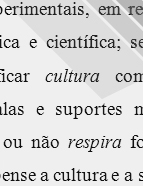

................................
And while, in the concise assertion of Cicero, the term cultus anchors Greek paideia and the self-formative ideal of logos, alternatively, the root of cultura agri (ager, natura) is differentiated from cultura animi (of the spirit), for the Being allows itself to be cultivated. Alterity, however, insists on the paradox of the Latin (ars, root of "arar,"["to plough"] craft, artifice) and Greek (artys, "construction," poiesis, house) correlation: in the semiology of culture, the artistic field is united, inseparable as analogous ars disserendi, creative dialogism, is part of it (Archer, " Para uma arqueologia do conceito de cultura," [Towards and archaeology of the concept of culture"] 2006). Contradicting Hegel, for whom the historical moment bears intrinsic legibility, homogeneity, continuity, and its own cultural significance (objectification of the Spirit in the phenomenological reality in which it is conveyed), Nietzsche opened a crack in the disjunctive, conflictual, discontinuous, and eruptive conceptual apprehension of cultural historicity. Obscure without access to the study of anthropological and historical time and to the space of its transitory and metamorphic revelations, culture is thus the world of representations of the world, including humans, fragmented even when evidencing the coincident historical locution of temporality and the essential object of this historicity. As attested by R. Chartier, if "the very representations of the social world are components of social reality," then the history of culture is (also) a history of cultural practices (in Hunt, The New Cultural History, 1993, pp. 230-33), adhering to the study of the production and circulation of texts, artifacts, and knowledge and their social and individual "reception." Colere (>cultus) associates the meanings of harvest, effort and product: culture is the attempt (school, choice, ex-colere) and crop. While today's media blubber tends to dismantle the arcane semiotic boundaries of bipartitions—elite culture and popular culture; scientific and mass culture, etc.—for the perspective of the history of culture, useful theoretical hypotheses have prevailed in the sociological pairs. But knowing that subjectivation—even in the most normative limits of the text—occurs at the moment of "reading," the de-subjectivation of the cognizant subject is thus the illusion nurtured by the sociological, systemic, and naturalistic paradigm while analysing culture as Enlightenment scientia, cognitio naturalis rerum omnium, degrading the rift of vis libera, vis libertatis that announces itself in its very enunciation.
